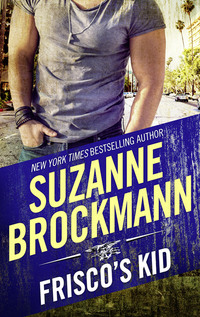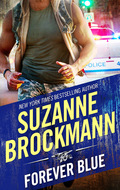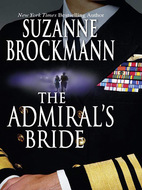Kitap dosya olarak indirilemez ancak uygulamamız üzerinden veya online olarak web sitemizden okunabilir.
Kitabı oku: «Frisco's Kid»
New York Times and USA TODAY bestselling author Suzanne Brockmann has thrilled audiences with her Tall, Dark and Dangerous series. Experience it here with a hero who must face the most daring adventure of all—falling in love.
His body may heal, but his heart is another story…
Being a Navy SEAL is more than a career to Alan “Frisco” Francisco—it’s his whole identity. But when a severe injury threatens Frisco’s ability to function in combat, he’s determined to achieve a full recovery.
But the unexpected appearance of his abandoned niece leaves Frisco with little time for anything but dealing with the five-year-old girl. He knows even less about parenting than he does about how to mend his broken body. And there’s no way he’s going to accept offers of help from his interfering neighbor, Mia Summerton. He doesn’t need anyone’s help. Not to care for his niece, not to accept his limitations and certainly not to fall in love.
Frisco’s Kid
Suzanne Brockmann

MILLS & BOON
Before you start reading, why not sign up?
Thank you for downloading this Mills & Boon book. If you want to hear about exclusive discounts, special offers and competitions, sign up to our email newsletter today!
Or simply visit
Mills & Boon emails are completely free to receive and you can unsubscribe at any time via the link in any email we send you.
For my cousin, Elise Kramer,
who played with and loved my mother,
then me, and now my children, too,
as if we were her own kids.
With all my love, Elise, this one’s for you.
CONTENTS
COVER
BACK COVER TEXT
TITLE PAGE
DEDICATION
CHAPTER 1
CHAPTER 2
CHAPTER 3
CHAPTER 4
CHAPTER 5
CHAPTER 6
CHAPTER 7
CHAPTER 8
CHAPTER 9
CHAPTER 10
CHAPTER 11
CHAPTER 12
CHAPTER 13
CHAPTER 14
CHAPTER 15
CHAPTER 16
CHAPTER 17
COPYRIGHT
CHAPTER 1
Frisco’s knee was on fire.
He had to lean heavily on his cane to get from the shower to the room he shared with three other vets, and still his leg hurt like hell with every step he took.
But pain was no big deal. Pain had been part of Navy Lt. Alan “Frisco” Francisco’s everyday life since his leg had damn near been blown off more than five years ago during a covert rescue operation. The pain he could handle.
It was this cane that he couldn’t stand.
It was the fact that his knee wouldn’t—couldn’t—support his full weight or fully extend that made him crazy.
It was a warm California day, so he pulled on a pair of shorts, well aware that they wouldn’t hide the raw, ugly scars on his knee.
His latest surgery had been attempted only a few months ago. They’d cut him open all over again, trying, like Humpty Dumpty, to put all the pieces back together. After the required hospital stay, he’d been sent here, to this physical therapy center, to build up strength in his leg, and to see if the operation had worked—to see if he had more flexibility in his injured joint.
But his doctor had been no more successful than the legendary King’s horses and King’s men. The operation hadn’t improved Frisco’s knee. His doctor couldn’t put Frisco together again.
There was a knock on the door, and it opened a crack.
“Yo, Frisco, you in here?”
It was Lt. Joe Catalanotto, the commander of SEAL Team Ten’s Alpha Squad—the squad to which, an aeon of pain and frustration and crushed hopes ago, Frisco had once belonged.
“Where else would I be?” Frisco said.
He saw Joe react to his bitter words, saw the bigger man’s jaw tighten as he came into the room, closing the door behind him. He could see the look in Joe’s dark eyes—a look of wary reserve. Frisco had always been the optimist of Alpha Squad. His attitude had always been upbeat and friendly. Wherever they went, Frisco had been out in the street, making friends with the locals. He’d been the first one smiling, the man who’d make jokes before a high-altitude parachute jump, relieving the tension, making everyone laugh.
But Frisco wasn’t laughing now. He’d stopped laughing five years ago, when the doctors had walked into his hospital room and told him his leg would never be the same. He’d never walk again.
At first he’d approached it with the same upbeat, optimistic attitude he’d always had. He’d never walk again? Wanna make a bet? He was going to do more than walk again. He was going to bring himself back to active duty as a SEAL. He was going to run and jump and dive. No question.
It had taken years of intense focus, operations and physical therapy. He’d been bounced back and forth from hospitals to physical therapy centers to hospitals and back again. He’d fought long and hard, and he could walk again.
But he couldn’t run. He could do little more than limp along with his cane—and his doctors warned him against doing too much of that. His knee couldn’t support his weight, they told him. The pain that he stoically ignored was a warning signal. If he wasn’t careful, he’d lose what little use he did have of his leg.
And that wasn’t good enough.
Because until he could run, he couldn’t be a SEAL again.
Five years of disappointment and frustration and failure had worn at Frisco’s optimism and upbeat attitude. Five years of itching to return to the excitement of his life as a Navy SEAL; of being placed into temporary retirement with no real, honest hope of being put back into active duty; of watching as Alpha Squad replaced him—replaced him; of shuffling along when he burned to run. All those years had worn him down. He wasn’t upbeat anymore. He was depressed. And frustrated. And angry as hell.
Joe Catalanotto didn’t bother to answer Frisco’s question. His hawklike gaze took in Frisco’s well-muscled body, lingering for a moment on the scars on his leg. “You look good,” Joe said. “You’re keeping in shape. That’s good. That’s real good.”
“Is this a social call?” Frisco asked bluntly.
“Partly,” Joe said. His rugged face relaxed into a smile. “I’ve got some good news I wanted to share with you.”
Good news. Damn, when was the last time Frisco had gotten good news?
One of Frisco’s roommates, stretched out on his bed, glanced up from the book he was reading.
Joe didn’t seem to mind. His smile just got broader. “Ronnie’s pregnant,” he said. “We’re going to have a kid.”
“No way.” Frisco couldn’t help smiling. It felt odd, unnatural. It had been too long since he’d used those muscles in his face. Five years ago, he’d have been pounding Joe on the back, cracking ribald jokes about masculinity and procreation and laughing like a damn fool. But now the best he could muster up was a smile. He held out his hand and clasped Joe’s in a handshake of congratulations. “I’ll be damned. Who would’ve ever thought you’d become a family man? Are you terrified?”
Joe grinned. “I’m actually okay about it. Ronnie’s the one who’s scared to death. She’s reading every book she can get her hands on about pregnancy and babies. I think the books are scaring her even more.”
“God, a kid,” Frisco said again. “You going to call him Joe Cat, Junior?”
“I want a girl,” Joe admitted. His smile softened. “A redhead, like her mother.”
“So what’s the other part?” Frisco asked. At Joe’s blank look, he added, “You said this was partly a social call. That means it’s also partly something else. Why else are you here?”
“Oh. Yeah. Steve Horowitz called me and asked me to come sit in while he talked to you.”
Frisco slipped on a T-shirt, instantly wary. Steve Horowitz was his doctor. Why would his doctor want Joe around when he talked to Frisco? “What about?”
Joe wouldn’t say, but his smile faded. “There’s an officer’s lounge at the end of the hall,” he said. “Steve said he’d meet us there.”
A talk in the officer’s lounge. This was even more serious than Frisco had guessed. “All right,” he said evenly. It was pointless to pressure Joe. Frisco knew his former commander wouldn’t tell him a thing until Steve showed up.
“How’s the knee?” Joe asked as they headed down the corridor. He purposely kept his pace slow and easy so that Frisco could keep up.
Frisco felt a familiar surge of frustration. He hated the fact that he couldn’t move quickly. Damn, he used to break the sprint records during physical training.
“It’s feeling better today,” he lied. Every step he took hurt like hell. The really stupid thing was that Joe knew damn well how much pain he was in.
He pushed open the door to the officer’s lounge. It was a pleasant enough room, with big, overstuffed furniture and a huge picture window overlooking the gardens. The carpet was a slightly lighter shade of blue than the sky, and the green of the furniture upholstery matched the abundant life growing outside the window. The colors surprised him. Most of the time Frisco had spent in here was late at night, when he couldn’t sleep. In the shadowy darkness, the walls and furniture had looked gray.
Steven Horowitz came into the room, a step behind them. “Good,” he said in his brisk, efficient manner. “Good, you’re here.” He nodded to Joe. “Thank you, Lieutenant, for coming by. I know your schedule’s heavy, too.”
“Not too heavy for this, Captain,” Joe said evenly.
“What exactly is ‘this’?” Frisco asked. He hadn’t felt this uneasy since he’d last gone out on a sneak-and-peek—an information-gathering expedition behind enemy lines.
The doctor gestured to the couch. “Why don’t we sit down?”
“I’ll stand, thanks.” Frisco had sat long enough during those first few years after he’d been injured. He’d spent far too much time in a wheelchair. If he had his choice, he’d never sit again.
Joe made himself comfortable on the couch, his long legs sprawled out in front of him. The doctor perched on the edge of an armchair, his body language announcing that he wasn’t intending to stay long.
“You’re not going to be happy about this,” Horowitz said bluntly to Frisco, “but yesterday I signed papers releasing you from this facility.”
Frisco couldn’t believe what he was hearing. “You did what?”
“You’re out of here,” the doctor said, not unkindly. “As of fourteen hundred hours today.”
Frisco looked from the doctor to Joe and back. Joe’s eyes were dark with unhappiness, but he didn’t contradict the doctor’s words. “But my physical therapy sessions—”
“Have ended,” Horowitz said. “You’ve regained sufficient use of your knee and—”
“Sufficient for what?” Frisco asked, outraged. “For hobbling around? That’s not good enough, dammit! I need to be able to run. I need to be able to—”
Joe sat up. “Steve told me he’s been watching your chart for weeks,” the commander of Alpha Squad told Frisco quietly. “Apparently, there’s been no improvement—”
“So I’m in a temporary slump. It happens in this kind of—”
“Your therapist has expressed concern that you’re over-doing it.” Horowitz interrupted him. “You’re pushing yourself too hard.”
“Cut the crap.” Frisco’s knuckles were white as he gripped his cane. “My time is up. That’s what this is about, isn’t it?” He looked back at Joe. “Someone upstairs decided that I’ve had my share of the benefits. Someone upstairs wants my bed emptied, so that it can be filled by some other poor son of a bitch who has no real hope of a full recovery, right?”
“Yeah, they want your bed,” Joe said, nodding. “That’s certainly part of it. There’s limited bed space in every VA facility. You know that.”
“Your progress has begun to decline,” the doctor added. “I’ve told you this before, but you haven’t seemed to catch on. Pain is a signal from your body to your brain telling you that something is wrong. When your knee hurts, that does not mean push harder. It means back off. Sit down. Give yourself a break. If you keep abusing yourself this way, Lieutenant, you’ll be back in a wheelchair by August.”
“I’ll never be back in a wheelchair. Sir.” Frisco said the word sir, but his tone and attitude said an entirely different, far-less-flattering word.
“If you don’t want to spend the rest of your life sitting down, then you better stop punishing a severely injured joint,” Dr. Horowitz snapped. He sighed, taking a deep breath and lowering his voice again. “Look, Alan, I don’t want to fight with you. Why can’t you just be grateful for the fact that you can stand. You can walk. Sure, it’s with a cane, but—”
“I’m going to run,” Frisco said. “I’m not going to give up until I can run.”
“You can’t run,” Steven Horowitz said bluntly. “Your knee won’t support your weight—it won’t even properly extend. The best you’ll manage is an awkward hop.”
“Then I need another operation.”
“What you need is to get on with your life.”
“My life requires an ability to run,” Frisco said hotly. “I don’t know too many active-duty SEALs hobbling around with a cane. Do you?”
Dr. Horowitz shook his head, looking to Joe for help.
But Joe didn’t say a word.
“You’ve been in and out of hospitals and PT centers for five years,” the doctor told Frisco. “You’re not a kid in your twenties anymore, Alan. The truth is, the SEALs don’t need you. They’ve got kids coming up from BUD/S training who could run circles around you even if you could run. Do you really think the top brass are going to want some old guy with a bum knee to come back?”
Frisco carefully kept his face expressionless. “Thanks a lot, man,” he said tightly as he gazed sightlessly out of the window. “I appreciate your vote of confidence.”
Joe shifted in his seat. “What Steve’s saying is harsh—and not entirely true,” he said. “Us ‘old guys’ in our thirties have experience that the new kids lack, and that usually makes us better SEALs. But he’s right about something—you have been out of the picture for half a decade. You’ve got more to overcome than the physical challenge—as if that weren’t enough. You’ve got to catch up with the technology, relearn changed policies….”
“Give yourself a break,” Dr. Horowitz urged again.
Frisco turned his head and looked directly at the doctor. “No,” he said. He looked at Joe, too. “No breaks. Not until I can walk without this cane. Not until I can run a six-minute mile again.”
The doctor rolled his eyes in exasperation, standing up and starting for the door. “A six-minute mile? Forget it. It’s not going to happen.”
Frisco looked out the window again. “Captain, you also said I’d never walk again.”
Horowitz turned back. “This is different, Lieutenant. The truth—whether you believe it or not—is that the kind of physical exertion you’ve been up to is now doing your knee more damage than good.”
Frisco didn’t turn around. He stood silently, watching bright pink flowers move gently in the breeze.
“There are other things you can do as a SEAL,” the doctor said more gently. “There are office jobs—”
Frisco spun around, his temper exploding. “I’m an expert in ten different fields of warfare, and you want me to be some kind of damn pencil pusher?”
“Alan—”
Joe stood up. “You’ve at least got to take some time and think about your options,” he said. “Don’t say no until you think it through.”
Frisco gazed at Joe in barely disguised horror. Five years ago they’d joked about getting injured and being sucked into the administrative staff. It was a fate worse than death, or so they’d agreed. “You want me to think about jockeying a desk?” he said.
“You could teach.”
Frisco shook his head in disbelief. “That’s just perfect, man. Can’t you just see me writing on a blackboard…?” He shook his head in disgust. “I would’ve expected you of all people to understand why I could never do that.”
“You’d still be a SEAL,” Joe persisted. “It’s that or accept your retirement as permanent. Someone’s got to teach these new kids how to survive. Why can’t you do it?”
“Because I’ve been in the middle of action,” Frisco nearly shouted. “I know what it’s like. I want to go back there, I want to be there. I want to be doing, not…teaching. Damn!”
“The Navy doesn’t want to lose you,” Joe said, his voice low and intense. “It’s been five years, and there’s still been nobody in the units who can touch you when it comes to strategic warfare. Sure, you can quit. You can spend the rest of your life trying to get back what you once had. You can lock yourself away and feel sorry for yourself. Or you can help pass your knowledge on to the next generation of SEALs.”
“Quit?” Frisco said. He laughed, but there was no humor in it at all. “I can’t quit—because I’ve already been kicked out. Right, Captain Horowitz? As of fourteen hundred hours, I’m outta here.”
There was silence then—silence that settled around them all, heavy and still and thick.
“I’m sorry,” the doctor finally said. “I’ve got to do what is best for you and for this facility. We need to use your bed for someone who really could use it. You need to give your knee a rest before you damage it further. The obvious solution was to send you home. Someday you’ll thank me for this.” The door clicked as it closed behind him.
Frisco looked at Joe. “You can tell the Navy that I’m not going to accept anything short of active duty,” he said bluntly. “I’m not going to teach.”
There was compassion and regret in the bigger man’s dark eyes. “I’m sorry,” Joe said quietly.
Frisco glared up at the clock that was set into the wall. It was nearly noon. Two more hours, and he’d have to pack up his things and leave. Two more hours, and he wouldn’t be a Navy SEAL, temporarily off the active duty list, recovering from a serious injury. In two hours he’d be former Navy SEAL Lt. Alan Francisco. In two hours, he’d be a civilian, with nowhere to go, nothing to do.
Anger hit him hard in the gut. Five years ago, it was a sensation he’d rarely felt. He’d been calm, he’d been cool. But nowadays, he rarely felt anything besides anger.
But wait. He did have somewhere to go. The anger eased up a bit. Frisco had kept up the payments on his little condo in San Felipe, the low-rent town outside of the naval base. But…once he arrived in San Felipe, then what? He would, indeed, have nothing to do.
Nothing to do was worse than nowhere to go. What was he going to do? Sit around all day, watching TV and collecting disability checks? The anger was back, this time lodging in his throat, choking him.
“I can’t afford to continue the kind of physical therapy I’ve been doing here at the hospital,” Frisco said, trying to keep his desperation from sounding in his voice.
“Maybe you should listen to Steve,” Joe said, “and give your leg a rest.”
Easy for Joe to say. Joe was going to stand up and walk out of this hospital without a cane, without a limp, without his entire life shattered. Joe was going to go back to the home he shared with his beautiful wife—who was pregnant with their first child. He was going to have dinner with Veronica, and later he’d probably make love to her and fall asleep with her in his arms. And in the morning, Joe was going to get up, go for a run, shower, shave and get dressed, and go into work as the commanding officer of SEAL Team Ten’s Alpha Squad.
Joe had everything.
Frisco had an empty condo in a bad part of town.
“Congratulations about the baby, man,” Frisco said, trying as hard as he could to actually mean it. Then he limped out of the room.
CHAPTER 2
There was a light on in condo 2C.
Mia Summerton stopped in the parking lot, her arms straining from the weight of her grocery bags, and looked up at the window of the second-floor condo that was next to her own. Apartment 2C had remained empty and dark for so many years, Mia had started to believe that its owner would never come home.
But that owner—whoever he was—was home tonight.
Mia knew that the owner of 2C was, indeed, a “he.” She got a better grip on the handles of her cloth bags and started for the outside cement stairs that led up to the second story and her own condo. His name was Lt. Alan Francisco, U.S.N., Ret. She’d seen his name in the condo association owner’s directory, and on the scattered pieces of junk mail that made it past the post office’s forwarding system.
As far as Mia could figure out, her closest neighbor was a retired naval officer. With no more than his name and rank to go on, she had left the rest to her imagination. He was probably an older man, maybe even elderly. He had possibly served during the Second World War. Or perhaps he’d seen action in Korea or Vietnam.
Whatever the case, Mia was eager to meet him. Next September, her tenth graders were going to be studying American history, from the stock market crash through to the end of the Vietnam conflict. With any luck, Lt. Alan Francisco, U.S.N., Ret., would be willing to come in and talk to her class, tell his story, bring the war he’d served in down to a personal level.
And that was the problem with studying war. Until it could be understood on a personal level, it couldn’t be understood at all.
Mia unlocked her own condo and carried her groceries inside, closing the door behind her with her foot. She quickly put the food away and stored her cloth grocery bags in the tiny broom closet. She glanced at herself in the mirror and adjusted and straightened the high ponytail that held her long, dark hair off her neck.
Then she went back outside, onto the open-air corridor that connected all of the second-floor units in the complex.
The figures on the door, 2C, were slightly rusted, but they still managed to reflect the floodlights from the courtyard, even through the screen. Not allowing herself time to feel nervous or shy, Mia pressed the doorbell.
She heard the buzzer inside of the apartment. The living room curtains were open and the light was on inside, so she peeked in.
Architecturally, it was the mirror image of her own unit. A small living room connected to a tiny dining area, which turned a corner and connected to a galley kitchen. Another short hallway led back from the living room to two small bedrooms and a bath. It was exactly the same as her place, except the layout of the rooms faced the opposite direction.
His furniture was an exact opposite of Mia’s, too. Mia had decorated her living room with bamboo and airy, light colors. Lieutenant Francisco’s was filled with faintly shabby-looking mismatched pieces of dark furniture. His couch was a dark green plaid, and the slipcovers were fraying badly. His carpeting was the same forest green that Mia’s had been when she’d first moved in, three years ago. She’d replaced hers immediately.
Mia rang the bell again. Still no answer. She opened the screen and knocked loudly on the door, thinking if Lieutenant Francisco was an elderly man, he might be hard of hearing….
“Looking for someone in particular?”
Mia spun around, startled, and the screen door banged shut, but there was no one behind her.
“I’m down here.”
The voice carried up from the courtyard, and sure enough, there was a man standing in the shadows. Mia moved to the railing.
“I’m looking for Lieutenant Francisco,” she said.
He stepped forward, into the light. “Well, aren’t you lucky? You found him.”
Mia was staring. She knew she was staring, but she couldn’t help herself.
Lt. Alan Francisco, U.S.N., Ret., was no elderly, little man. He was only slightly older than she was—in his early thirties at the most. He was young and tall and built like a tank. The sleeveless shirt he was wearing revealed muscular shoulders and arms, and did very little to cover his powerful-looking chest.
His hair was dark blond and cut short, in an almost boxlike military style. His jaw was square, too, his features rugged and harshly, commandingly handsome. Mia couldn’t see what color his eyes were—only that they were intense, and that he examined her as carefully as she studied him.
He took another step forward, and Mia realized he limped and leaned heavily on a cane.
“Did you want something besides a look at me?’ he asked.
His legs were still in the shadows, but his arms were in the light. And he had tattoos. One on each arm. An anchor on one arm, and something that looked like it might be a mermaid on the other. Mia pulled her gaze back to his face.
“I, um…’ she said. “I just…wanted to say…hi. I’m Mia Summerton. We’re next-door neighbors,” she added lamely. Wow, she sounded like one of her teenage students, tongue-tied and shy.
It was more than his rugged good looks that was making her sound like a space cadet. It was because Lt. Alan Francisco was a career military man. Despite his lack of uniform, he was standing there in front of her, shoulders back, head held high—the Navy version of G.I. Joe. He was a warrior not by draft but by choice. He’d chosen to enlist. He’d chosen to perpetuate everything Mia’s antiwar parents had taught her to believe was wrong.
He was still watching her as closely as she’d looked at him. “You were curious,” he said. His voice was deep and accentless. He didn’t speak particularly loudly, but his words carried up to her quite clearly.
Mia forced a smile. “Of course.”
“Don’t worry,” he said. He didn’t smile back. In fact, he hadn’t smiled once since she’d turned to look over the railing at him. “I’m not loud. I don’t throw wild parties. I won’t disturb you. I’ll stay out of your way and I hope you’ll have the courtesy to do the same.”
He nodded at her, just once, and Mia realized that she’d been dismissed. With a single nod, he’d just dismissed her as if she were one of his enlisted troops.
As Mia watched, the former Navy lieutenant headed toward the stairs. He used his cane, supporting much of his weight with it. And every step he took looked to be filled with pain. Was he honestly going to climb those stairs…?
But of course he was. This condo complex wasn’t equipped with elevators or escalators or anything that would provide second-floor accessibility to the physically challenged. And this man was clearly challenged.
But Lieutenant Francisco pulled himself up, one painful step at a time. He used the cast-iron railing and his upper-body strength to support his bad leg, virtually hopping up the stairs. Still, Mia could tell that each jarring movement caused him no little amount of pain. When he got to the top, he was breathing hard, and there was a sheen of sweat on his face.
Mia spoke from her heart as usual, not stopping to think first. “There’s a condo for sale on the ground floor,” she said. “Maybe the association office can arrange for you to exchange your unit for the…one on the…”
The look he gave her was withering. “You still here?” His voice was rough and his words rude. But as he looked up again, as for one brief moment he glanced into her eyes, Mia could see myriad emotions in his gaze. Anger. Despair. Shame. An incredible amount of shame.
Mia’s heart was in her throat. “I’m sorry,” she said, her gaze dropping almost involuntarily to his injured leg. “I didn’t mean to—”
He moved directly underneath one of the corridor lights, and held up his right leg slightly. “Pretty, huh?” he said.
His knee was a virtual railroad switching track of scars. The joint itself looked swollen and sore. Mia swallowed. “What—” she said, then cleared her throat. “What…happened…?”
His eyes were an odd shade of blue, she realized, gazing up into the swirl of color. They were dark blue, almost black. And they were surrounded by the longest, thickest eyelashes she’d ever seen on a man.
Up close, even despite the shine of perspiration on his face, Mia had to believe that Lt. Alan Francisco was the single most attractive man she had ever seen in her entire twenty-seven years.
His hair was dark blond. Not average, dirty blond, but rather a shiny mixture of light brown with streaks and flashes of gold and even hints of red that gleamed in the light. His nose was big, but not too big for his face, and slightly crooked. His mouth was wide. Mia longed to see him smile. What a smile this man would have, with a generous mouth like that. There were laugh lines at the corners of his mouth and his eyes, but they were taut now with pain and anger.
“I was wounded,” he said brusquely. “During a military op.”
He had been drinking. He was close enough for Mia to smell whiskey on his breath. She moved back a step. “Military…op?”
“Operation,” he said.
“That must have been…awful,” she said. “But…I wasn’t aware that the United States has been involved in any naval battles recently. I mean, someone like, oh, say…the President would let us all know if we were at war, wouldn’t he?”
“I was wounded during a search-and-rescue counterterrorist operation in downtown Baghdad,” Francisco said.
“Isn’t Baghdad a little bit inland for a sailor?”
“I’m a Navy SEAL,” he said. Then his lips twisted into a grim version of a smile. “Was a Navy SEAL,” he corrected himself.
Frisco realized that she didn’t know what he meant. She was looking up at him with puzzlement in her odd-colored eyes. They were a light shade of brown and green—hazel, he thought it was called—with a dark brown ring encircling the edges of her irises. Her eyes had a slightly exotic tilt to them, as if somewhere, perhaps back in her grandparents’ generation, there was Asian or Polynesian blood. Hawaiian. That was it. She looked faintly Hawaiian. Her cheekbones were wide and high, adding to the exotic effect. Her nose was small and delicate, as were her graceful-looking lips. Her skin was smooth and clear and a delicious shade of tan. Her long, straight black hair was up in a ponytail, a light fringe of bangs softening her face. Her hair was so long, that if she wore it down, it would hang all the way to her hips.
Ücretsiz ön izlemeyi tamamladınız.








